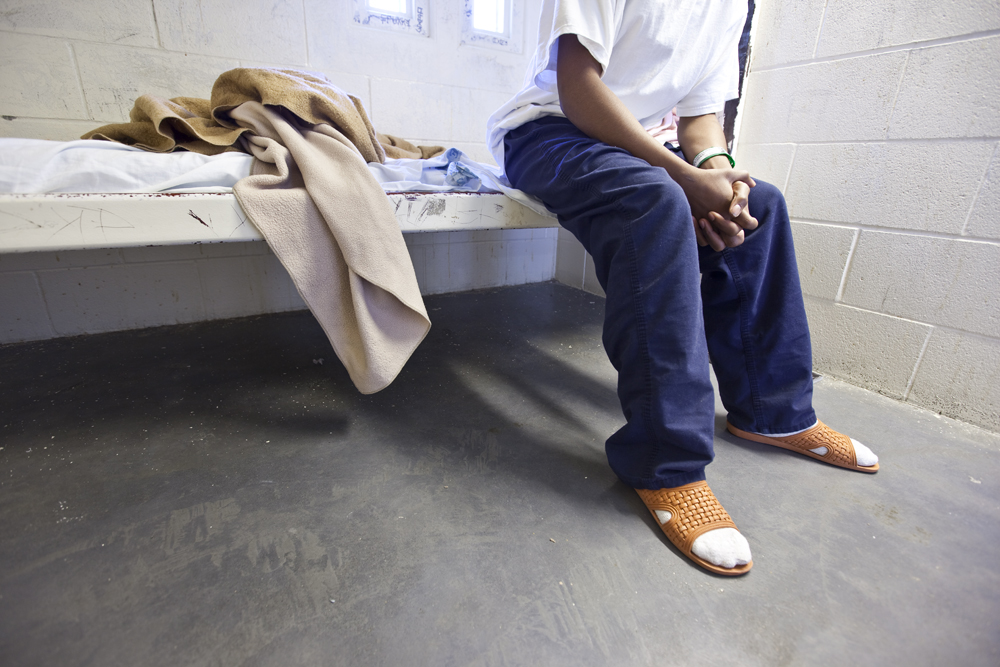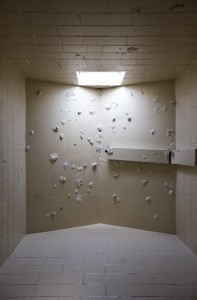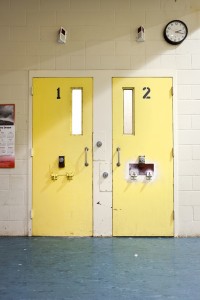 It’s April now, and I’m wondering how it came down to this, and how I stooped this low, and how I am in here because of these so-called friends.
It’s April now, and I’m wondering how it came down to this, and how I stooped this low, and how I am in here because of these so-called friends.
We just got back from school, and soon it will be lunchtime. We walk over to G-unit, and I walk straight up the stairs to my room while others stand around wasting time talking to Officer Rob, annoying him.
Rob is the guard assigned to our unit. He’s younger than the others and kinder too. He sings R&B songs to himself throughout the day and he doesn’t send us to our rooms for little things.
Our unit is just like the others: There are 10 rooms numbered from 1 to 10 – the four right ones have double bunks.
I walk to my room upstairs to Number 7 and close the door behind me. I hear the door lock, and I sit on my bed reading my “Spiderman” comic book until the next time I get to come out.
 This cell is so small sometimes I think I am living in my bathroom. My bunk is welded to the wall, and I have a thin mattress and two thin, brown blankets. There is toilet paper hanging from my ceiling, lots of gang writing carved into the walls. All I can see are white bricks and my purple steel door.
This cell is so small sometimes I think I am living in my bathroom. My bunk is welded to the wall, and I have a thin mattress and two thin, brown blankets. There is toilet paper hanging from my ceiling, lots of gang writing carved into the walls. All I can see are white bricks and my purple steel door.
It’s a very cold cell.
I have been here for well over three months and still don’t know when I’m getting out because they keep moving my court date.
I am not a bad person. I am only 14 years old and even though I am in juvenile detention, I still don’t disrespect my staff. I like to be honest and follow rules even though I’m looking at a harsh sentence. I get so lonely sometimes I start to talk to myself. I can’t have a roommate because I am so small and scrawny, but I am used to this now.
When the door pops, I feel relieved that it’s time for lunch. Once again we have the same warm tuna sandwich with American cheese. I am so used to this food now and I’m always looking forward to making trades for food since I barely get full. I hang out with older kids since I am the youngest and people use to take advantage of me by stealing my food.
These three other kids take good care of me since I’ve known them for so long and they don’t let people take my food.
The oldest is Ferris. He is 17 and has slicked hair and light skin. He is also very tall, almost six feet. The second is Nako. He is very short, pudgy and has dark skin and a Mohawk to go with his Presley’s, sideburns that go down to his chin. The final one is Ortiz. He is 5-foot-6, has a goatee and is the live one of the group. He’s cracking jokes from morning to night.
 As I walk down the stairs from my cell to the day room where there are four tables with four benches around each, I think about how every day is exactly the same and how I am so used to this.
As I walk down the stairs from my cell to the day room where there are four tables with four benches around each, I think about how every day is exactly the same and how I am so used to this.
Then Officer Rob calls my name as I’m walking down to lunch.
“You got court, Cuban. Go get a blue top and go to Post One.”
I walk over to the laundry area and I stare at the clothes we all wear every day: white shirts, white socks, blue pants and blue tops. I look for a small sized blue top with the V-neck collar and put it on.
As I am walking to Post One, I am wondering what this is about. I am feeling nervous and anxious to find out where I am headed.
An officer at Post One tells me to stand against the wall until they come to get me. I walk over to the wall, shaking, wondering what is going to happen to me.
Ivan wrote this essay for Rich Mohan's language arts class at King County Juvenile Youth Services; it was later published in the Interagency Academy literary journal and again at
KUOW.org. He currently lives in Shoreline, Washington.




 It’s April now, and I’m wondering how it came down to this, and how I stooped this low, and how I am in here because of these so-called friends.
It’s April now, and I’m wondering how it came down to this, and how I stooped this low, and how I am in here because of these so-called friends. This cell is so small sometimes I think I am living in my bathroom. My bunk is welded to the wall, and I have a thin mattress and two thin, brown blankets. There is toilet paper hanging from my ceiling, lots of gang writing carved into the walls. All I can see are white bricks and my purple steel door.
This cell is so small sometimes I think I am living in my bathroom. My bunk is welded to the wall, and I have a thin mattress and two thin, brown blankets. There is toilet paper hanging from my ceiling, lots of gang writing carved into the walls. All I can see are white bricks and my purple steel door. As I walk down the stairs from my cell to the day room where there are four tables with four benches around each, I think about how every day is exactly the same and how I am so used to this.
As I walk down the stairs from my cell to the day room where there are four tables with four benches around each, I think about how every day is exactly the same and how I am so used to this.
